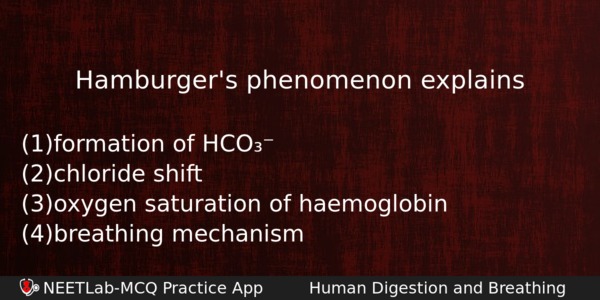| ⇦ | 
| ⇨ |
Hamburger’s phenomenon explains
Options
(a) formation of HCO₃⁻
(b) chloride shift
(c) oxygen saturation of haemoglobin
(d) breathing mechanism
Correct Answer:
chloride shift
Explanation:
Removal of CO₂from blood involves both influx of Cl ̄ions into RBCsand efflux of HCO₃ ̄ions from RBCs. Exit of bicarbonate ions, considerably change ionic balance between the plasma and the erythrocytes (RBCs). To restore this ionic balance, the chloride ions diffuse from the plasma into erythrocytes. This movement of chloride ions is called chloride shift (Hamburger’s phenomenon).
Related Questions: - Peripatus is a connecting link between:
- Which one of the following statements is wrong?
- Which of the following virus causes common cold?
- Which of the following is an amino acid derived hormone
- Cell wall of bacteria is composed of
Topics: Human Digestion and Breathing
(167)
Subject: Biology
(4253)
Important MCQs Based on Medical Entrance Examinations To Improve Your NEET Score
- Peripatus is a connecting link between:
- Which one of the following statements is wrong?
- Which of the following virus causes common cold?
- Which of the following is an amino acid derived hormone
- Cell wall of bacteria is composed of
Topics: Human Digestion and Breathing (167)
Subject: Biology (4253)
Important MCQs Based on Medical Entrance Examinations To Improve Your NEET Score
18000+ students are using NEETLab to improve their score. What about you?
Solve Previous Year MCQs, Mock Tests, Topicwise Practice Tests, Identify Weak Topics, Formula Flash cards and much more is available in NEETLab Android App to improve your NEET score.
Share this page with your friends

Leave a Reply